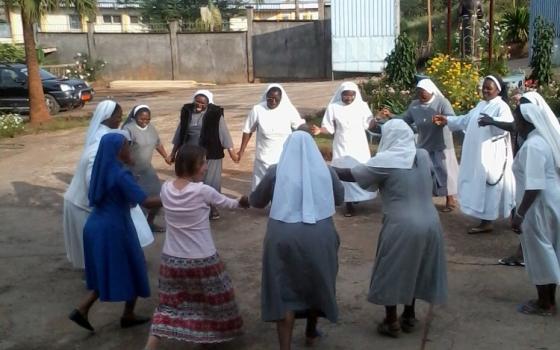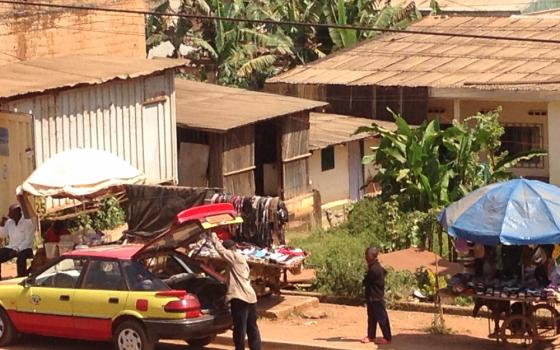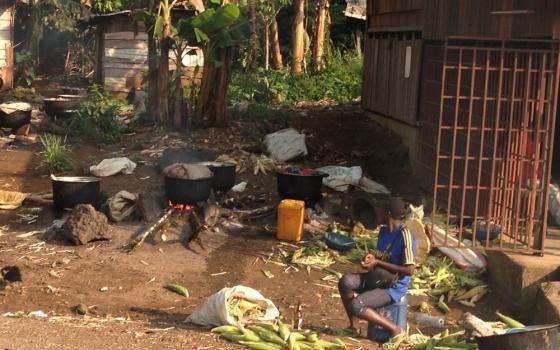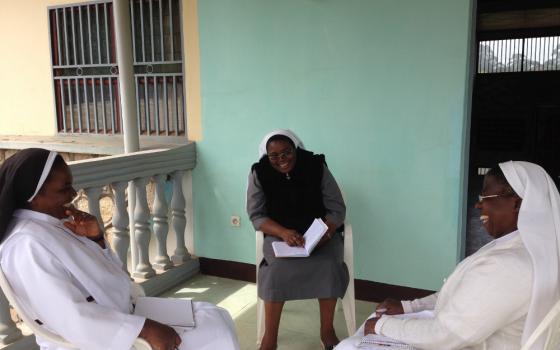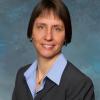It was striking to hear the first 2014 Christmas songs rehearsed by the church choir of the Bamenda parish in Cameroon during the month of November. I immediately found myself chiming in – and then grateful that my few weeks in Cameroon would include the opening of the celebration of the Year of Consecrated Life. As I reflected and prayed about Pope Francis’ invitation to women and men religious “to wake up the world,” little did I realize that the “world” would be waking me up.
Here I was on another continent of our beloved but vulnerable world. Growing up trilingual (German, Greek and German Sign Language), I was excited about the opportunity to travel and serve for three weeks in a new culture in Africa. My excitement was deeply rooted in a sense of gratitude that God was giving me the opportunity to give back all that God has graciously bestowed on me.
I went to Cameroon to present a “wellbeing” segment in a larger renewal program that the Tertiary Sisters of St. Francis (TSSFs) had initiated for women religious in 2011. The Franciscan Common Venture has sent sisters from their congregations each year as presenters. This year the participants and presenters expanded to sisters from other congregations. Fourteen sisters (ages from 30s to 70s) from four congregations in Cameroon were participating, and I was enthused about the opportunity to be of service to sisters whose ministries support and effect systemic change.
After the long drive between the Douala airport and Bamenda, I was energized by the participants’ traditional song of welcome and dance at the retreat center where the 12-week renewal program was based. After first presenting a “Wellbeing Speech” written by Ian Edwards, Ph.D., a colleague of mine in the counseling center at Duquesne University in Pittsburg, Pennsylvania, I focused my sessions on identifying and owning various levels of holistic wellbeing as they relate to the lives of African women religious. Most importantly, the focus was on the importance of a balanced lifestyle.
A balanced lifestyle that allows for community living and prayer, ministry, and leisure time could help prevent symptoms of burnout that are caused by exhaustion and repeated exposure to traumatic events. These are conditions the sisters know something about.
Although Cameroon is politically stable and was not affected by Ebola, it is affected by other diseases – typhus, malaria, tuberculosis, AIDS, cancer and heart conditions, among them – that can lead to fatal outcomes. And I was saddened as I listened to a European missionary sister explain that she had to leave her ministry and move further south because of the violence that was erupting in the northern part of Cameroon. (Just last month we learned about the hundreds of Boko Haram fighters who killed 91 villagers and left more than 500 wounded in Fotokol, a northern town.)
Mourning loved ones lost to serious illness and violence can lead to trauma symptoms among survivors and may also vicariously impact those who serve the poor, sick, wounded and dying, including medical personnel, clerics and men and women religious. The TSSFs, the largest religious congregation in Cameroon, do not hesitate to live and minister in places where the needs of their people are calling them to be present, even if they themselves are risking their personal safety.
My heart broke as I heard the story of a sister who ministered in places that were not safe, which repeatedly exposed her to violence. Her voice was shaking and I could see the fear in her eyes as she shared the details of these incidents.
Another sister expressed the difficulty of being with and attending to the wounded of wars that seemed to have no end in sight. The impact on her was evident and the effects lingered in her. Thankfully, these and other sisters by repeatedly sharing their stories are finding a way to integrate these painful and overwhelming experiences into their lives.
In being with the sisters, my eyes were opened to the privileged and secure lifestyle that I am living in the United States. It awakened my heart and desire to live my vows more intentionally and to ponder my call of being a prophetic witness as I become more globally minded in my ministerial outreach.
The sisters’ stories definitely had a lasting impact on me and made me realize that our evolutionary understanding of living the consecrated life is not limited to its impact within the United States. On the contrary, I am now awakened to the fact that our past and current decisions, pertaining to consecrated life, continue to spread to women religious internationally and influence their understanding and expression of this prophetic life form.
[Maria Clara Kreis, Ph.D., L.P., is a native of Germany and has lived for 18 years with her religious community of the Sisters of Divine Providence in the United States. She is currently the assistant director and outreach coordinator of the Counseling and Wellbeing Center at Duquesne University in Pittsburgh, Pennsylvania. Her research focuses on life satisfaction among Roman Catholic apostolic women religious. ]
